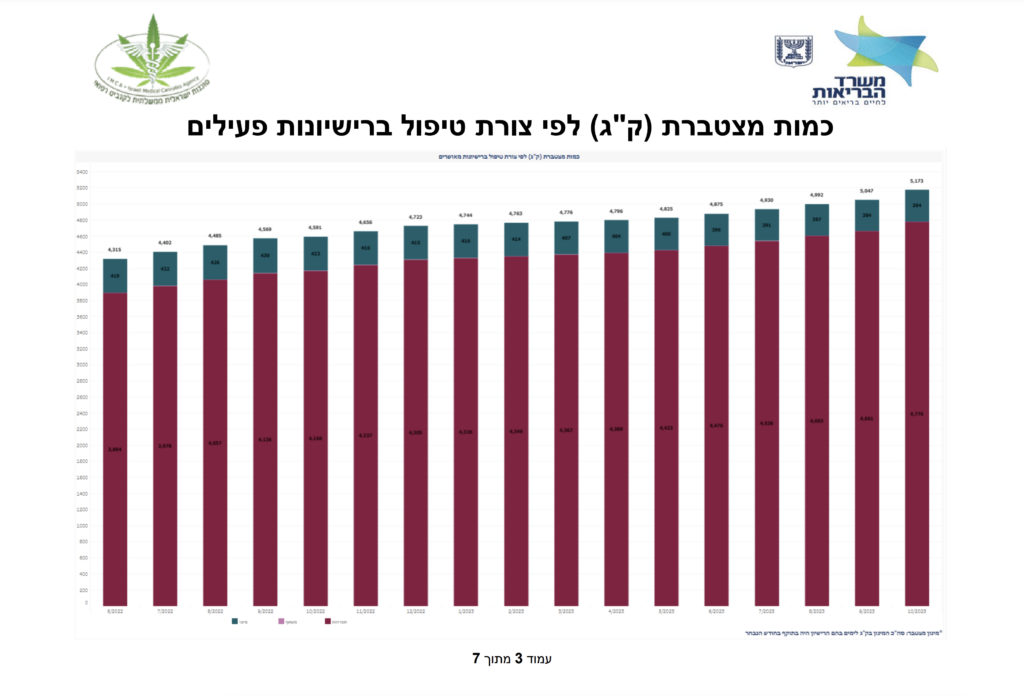A month into the war between Israel and Hamas, data from Israel’s Ministry of Health shows a sharp expansion in the reach of the medical marijuana program in that country. Patient enrollments have spiked, especially those tied to PTSD and pain, and doctors have prescribed more cannabis by weight than ever before.
Patient enrollment in Israel’s medical cannabis registry rose by 2,202 people in October, according to the newly released government numbers. That’s roughly twice the recent monthly average, though it’s not quite the rapid growth seen in early 2021, when nearly 3,000 patients were registering each month.
Regardless, Israel now has more registered medical cannabis patients than ever. And with more enrolled patients, there’s been a corresponding uptick in the amount of marijuana that is being prescribed. The country’s medical cannabis rules specify that a patient can purchase only up to a certain amount of specified products. In October, those products totaled 5,173 kilograms—not only a record in itself, but also the largest monthly increase ever recorded in the system, according to a local Israeli cannabis news publication. Data also showed an increase in the number of patients prescribed relatively high doses of marijuana.
Enrollment by qualifying condition, the local report noted, reflects an uptick in violence and wartime stressors. For example, data show an increase for the first time in at least a year in the number of marijuana prescriptions for “post-trauma,” or PTSD. Chronic pain continued to be a leading condition for marijuana patients, making up nearly three quarters of new enrollees, while another 400 patients in October enrolled for unspecified “other” conditions.
“It’s also possible that some of those who received a license marked ‘other’ this month are the victims of the war,” the news report says, “because as I recall, immediately after the events in the south, doctors began to issue licenses for post-trauma to the victims of the massacre and the residents of the south, but soon enough the Ministry of Health instructed the doctors to stop doing so, so it is possible that some of the doctors specified a different label.”
Just under half (45 percent) of Israeli medical marijuana patients are ages 21 to 45, according to the latest government numbers. Another third (34 percent) were 46 to 65, and about 18 percent were 65 or older. The small fraction of patients under 20 mainly represented children with epilepsy or autism.
Cumulative amount of cannabis (in kilograms) based on patient license types, via Israeli Ministry of Health
Israeli cannabis software maker BYND Cannasoft Enterprises, which put out a press release about the rise in medical marijuana since the attack by Gaza and ensuing violence, said that many of the cannabis patients are war casualties.
“Israel is a small country, and although we continue to take a business-as-usual approach, every one of us is directly impacted, either personally or through our family and loved ones,” said Yftah Ben Yaackov, the company’s CEO and director. “In Israel, the cannabis and pharmaceuticals industries are part of the critical infrastructure sector, and I am very proud of how the team is coming together to work through this horrific situation.”
Almost immediately after October 7 attack by Hamas, Israel extended medical cannabis patients’ prescriptions in response to fears by some that they would run out of marijuana. The Ministry of Health announced on the same day that patients whose licenses had expired or would expire within the next month would be granted a three-month extension.
Another pending change could lead to even more medical marijuana prescriptions. Beginning next month, patients will be able to access medical cannabis through a prescription written by any doctor, according to the Times of Israel. Currently, would-be patients have to seek a special license, either by seeking out specific cannabis-certified doctor or by applying to the Ministry of Health.
Israel isn’t the only place where war is leading people to seek relief from trauma and pain with medical cannabis.
In Ukraine, for example, the country’s President Volodymyr Zelensky has called for the legalization of medical marijuana to help people impacted by the “pain, stress and trauma of war.”
“We must finally, fairly legalize cannabis-based medicines for all those who need them,” he said in June, “with appropriate scientific research and controlled Ukrainian production.”
Last month, a committee of Ukrainian lawmakers passed legislation to legalize medical cannabis, sending the measure to the country’s full parliament. With approval, it would return to Zelensky’s desk for his signature.
Zelensky had previously voiced support for medical cannabis legalization during his presidential campaign, saying in 2019 that he felt it would be “normal” to allow people to access cannabis “droplets,” which was interpreted as a reference to marijuana tinctures.
The policy change would put Ukraine is stark contrast to its long-time aggressor, Russia, which has taken a particularly strong stance against reforming cannabis policy at the international level through the United Nations. Among other actions, the country has condemned Canada for legalizing marijuana nationwide.
Photo courtesy of Philip Steffan.
Read More Feedzy

